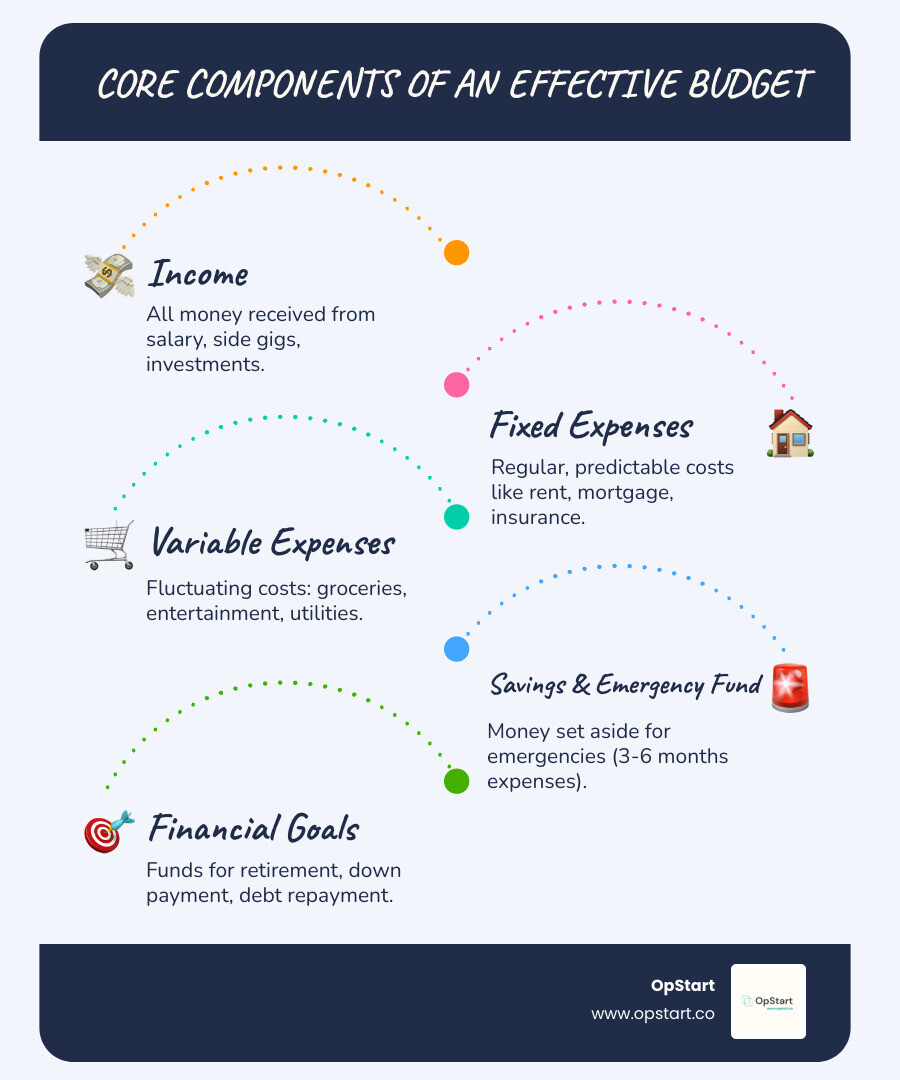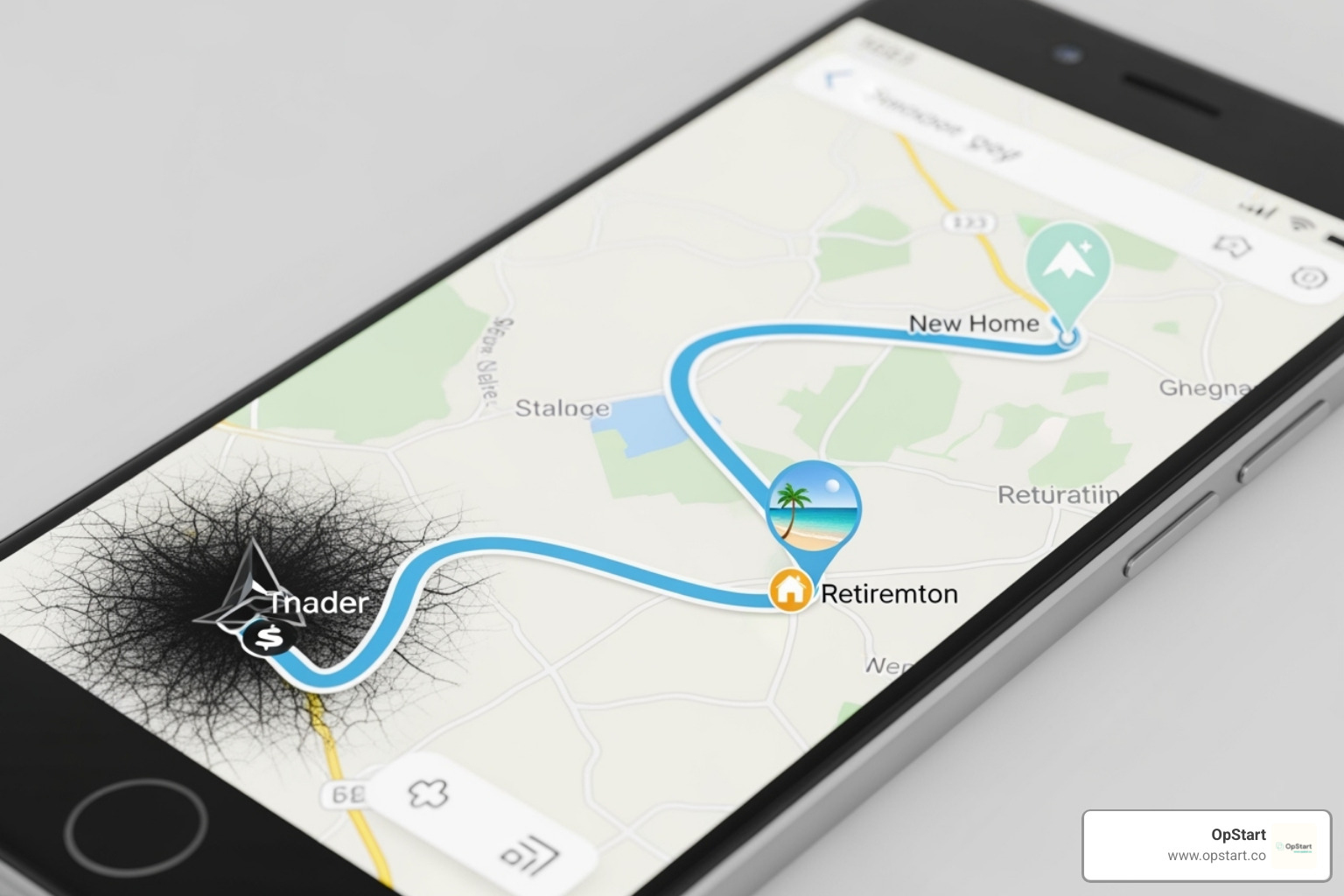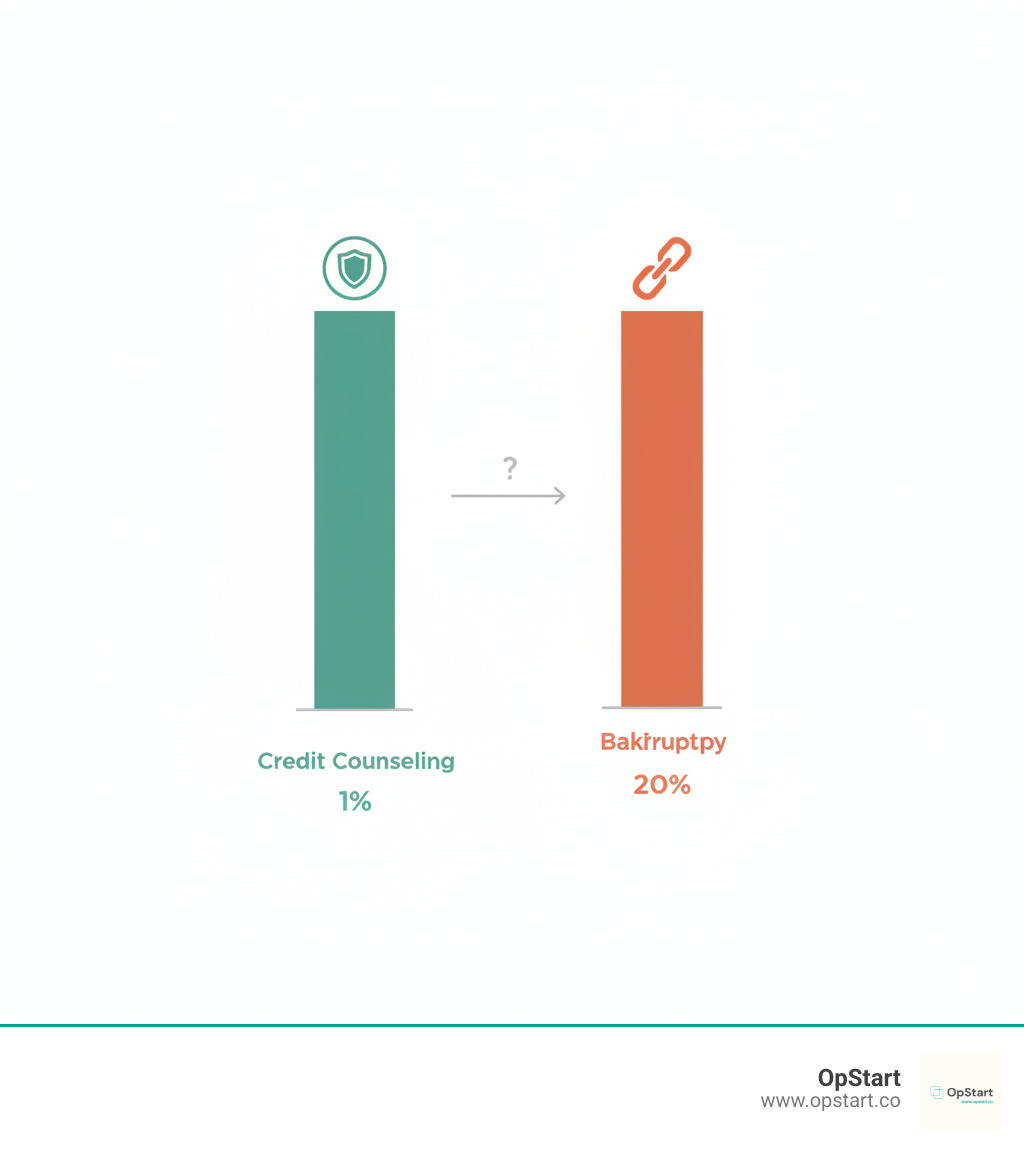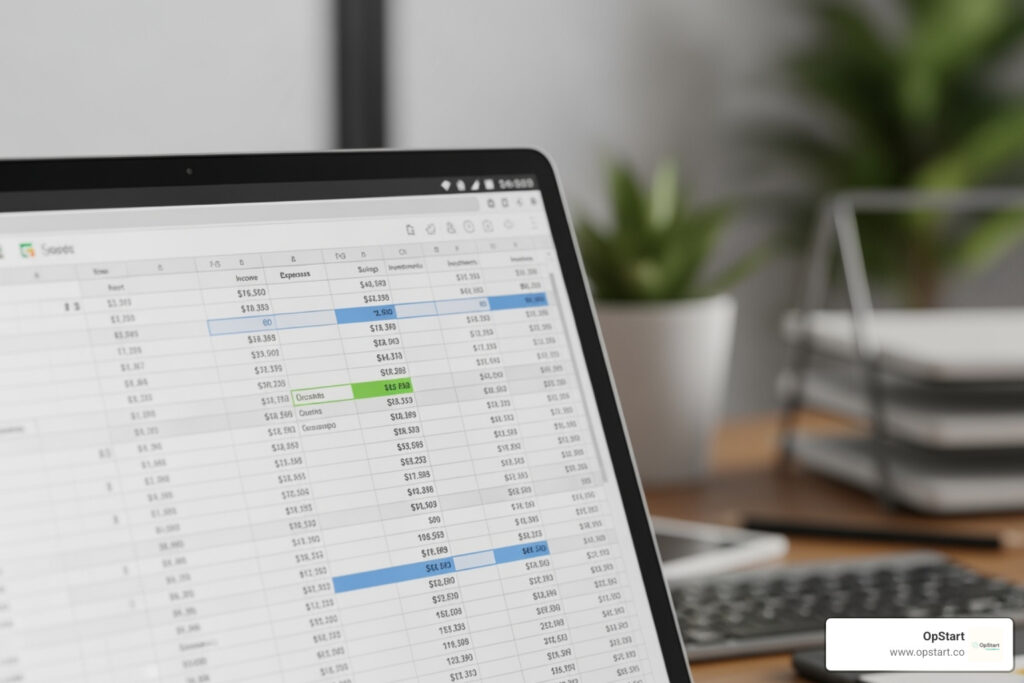Why Budget Planning Assistance Matters for Your Financial Future
Budget planning assistance helps you create and maintain a financial plan that balances your income, expenses, and savings goals—whether you’re managing household finances or running a fast-growing startup.
What Budget Planning Assistance Can Do for You:
- For Individuals: Track spending, reduce debt, build an emergency fund (3-6 months of living expenses), and achieve goals like buying a home or retiring comfortably.
- For Startups: Manage burn rate, extend runway, prepare for fundraising, and gain real-time financial visibility to make confident growth decisions.
- Key Support Options: DIY tools (apps, spreadsheets), credit counseling agencies, financial advisors, or specialized startup finance services.
The numbers tell a powerful story. Studies show that people who use a budget perform significantly better financially, with far higher rates of emergency savings than non-budgeters. With household debt at record highs and many people living paycheck to paycheck, having a clear financial plan isn’t optional—it’s essential.
The challenge is real. Many people find their monthly spending exceeds their income, and some even borrow money to cover daily expenses. Whether you’re struggling with personal finances or you’re a founder drowning in financial tasks while trying to scale your business, the right budget planning assistance can transform your financial reality.
I’m Maurina Venturelli, and I’ve spent my career helping high-growth companies build the financial foundations that fuel sustainable scaling—from leading the demand engine at Sumo Logic through its IPO to running full-stack marketing and now heading Go-to-Market at OpStart, where we provide expert-led budget planning assistance and complete finance-function-as-a-service for startups. The principles that drive business financial clarity work just as powerfully for personal finance.

Quick budget planning assistance definitions:
The Foundation: Why a Budget is Your Financial Roadmap

Managing your money without a budget is like navigating a new city without a map—stressful, confusing, and inefficient. A budget is your personal or business GPS, showing you where your money comes from, where it goes, and how to use it to reach your goals.
For individuals and families, a good budget is about financial wellness—feeling confident about your money. It helps you live within your means (spending less than you earn), which is a huge step toward reducing financial stress and gaining control.
Many people face a tough climb with debt. In the U.S., for example, the average individual debt (including mortgages) has surpassed $96,000. A solid budget helps you tackle that debt head-on, achieve your goals like buying a home, and start building wealth for the future.
For businesses, especially fast-growing startups, a budget is just as vital. It’s not just about rules; it’s about making smart choices that fuel growth. Want to dive deeper into how finance powers a business? Check out this resource: More info about the role of finance in a business.
Understanding Needs vs. Wants
An early step in effective budget planning assistance is learning the difference between what you need and what you want.
A need is essential for survival—like housing, food, and medicine. A want is nice to have but not essential, like a daily fancy coffee or the latest gadget.
This can be tricky, as a car might be a need for a commuter but a want for a city dweller. The key is to prioritize your needs in your budget to ensure the essentials are always covered.
Once needs are met, you can plan for wants or, even better, cut back on some wants to save more or pay off debt faster. Small changes add up! Skipping a $3 daily coffee could save you over $1,000 a year. Ready to find more ways to save? Find ways to save money by evaluating needs and wants.
Setting and Achieving Financial Goals
A budget isn’t about restriction; it’s about empowerment. It helps you say ‘yes’ to your future by turning your financial dreams into an actionable plan.
Whether you have short-term goals like clearing a credit card balance or long-term goals like saving for a home, your budget is the blueprint. It shows you exactly how much you can put towards these goals each month, turning big dreams into small, manageable steps.
A critical short-term goal for everyone is creating an emergency fund. This is money set aside for unexpected events, like a job loss or car repair. Aim for 3 to 6 months of living expenses. It’s your financial safety net, keeping you out of debt when life throws a curveball. Make sure your budget includes regular contributions to this fund! A Financial Goal Calculator can help you visualize your progress and stay motivated.
Building Your Budget: A Step-by-Step Guide
Now for the exciting part—building your budget. It might feel intimidating, but it’s simpler than you think. You’re creating a snapshot of your financial life, and once you see it all laid out, you’ll gain immediate clarity.

Step 1: Calculate Your Total Income
First, tally up all your income sources. This includes your main salary, side hustles, freelance work, or any other money coming in.
Focus on your net income—what actually hits your bank account after taxes and other deductions. This is your real spending power. Use recent pay stubs for accuracy. If your income is irregular, average it over several months to get a realistic estimate.
Step 2: Track and Categorize Your Expenses
This is where things get eye-opening. Most of us don’t know where our money goes until we track it. For at least one month, track every single expense using a notebook, spreadsheet, or budgeting app. Consistency is key.
Next, categorize your spending into two main buckets. Fixed expenses are predictable costs that stay the same each month, like rent or mortgage payments, loan payments, and insurance. Variable expenses change from month to month, such as groceries, dining out, utilities, and entertainment.
Your bank and credit card statements are goldmines for this data, as most banks already categorize transactions for you. A personal budget template can help you organize everything in one place.
Common expense categories include: housing, transportation, food, utilities, insurance, healthcare, debt payments, entertainment, personal care, and savings. Adjust them to fit your spending patterns.
Step 3: Analyze and Adjust
Now, compare what comes in versus what goes out. This is where budget planning assistance proves its value. Do you have money left over, or are you in a deficit?
If you’re spending more than you earn, don’t panic. Look at your variable expenses first, as this is where you have the most flexibility. Can you cook at home more often or cancel unused subscriptions? Small changes compound quickly.
A helpful framework is the 50/30/20 rule: 50% of your after-tax income to needs (housing, utilities, groceries), 30% to wants (dining out, hobbies), and 20% to savings and debt repayment. This is a flexible guideline, not a rigid rule. Adjust the percentages to fit your situation.
The goal is a realistic plan you can stick with. Review your budget regularly and adjust it as your life changes. Your budget is a living document that evolves with you.
From Personal Plan to Startup Strategy: Advanced Budgeting
So far, we’ve covered how a budget is your best friend for managing personal finances. These same principles are even more crucial for startups. While the basic idea is the same—knowing what’s coming in and going out—the stakes and complexity of a startup mean business budgeting is a strategic guide for growth and survival.

At OpStart, we know founders need to use financial data to make smart choices. Understanding how the finance function contributes to the business is key. Financial reports like the Income Statement, Balance Sheet, and especially the Cash Flow Statement become your most valuable tools. Knowing how to Read a Cash Flow Statement can be the difference between a startup thriving and struggling.
Key Components of a Startup Budget
A startup budget is more detailed than a personal one, covering several vital areas to plan for growth:
- Revenue Forecasting: Predicting future sales and income. Unlike a steady paycheck, startup revenue can be volatile, so accurate forecasting requires understanding market trends, sales cycles, and pricing.
- Expense Budgeting: This covers all operating costs. For new companies, headcount (your team’s salaries) is usually the biggest expense, followed by marketing, R&D, and software.
- Headcount Planning: A detailed plan for who you’ll hire, when, and at what cost. It’s critical since salaries are often the largest part of your budget.
- Capital Expenditures (CapEx): Investments in long-term assets like equipment or technology. This is crucial for hardware or biotech companies.
- Working Capital: The difference between current assets and current liabilities. It shows how much cash you have for daily operations, which is vital for companies holding inventory or with long payment cycles.
A structured tool like a Startup Budget Template can make managing these pieces much easier.
Why Startups Need Specialized Budget Planning Assistance
Starting a business is a high-stakes adventure where financial foresight is key. This is where specialized budget planning assistance becomes a game-changer.
One of the biggest reasons is managing burn rate and runway. Your “burn rate” is how fast you’re spending cash, and your “runway” is how much time you have before it runs out. Expert assistance helps founders track these metrics and find ways to extend their runway.
It’s also vital for preparing for fundraising. Investors demand detailed, realistic financial plans. A well-crafted budget shows investors you have a deep understanding of your business and the market.
Scenario planning is another huge benefit. A strong budget lets you model “what-if” situations, helping you prepare for market shifts, funding delays, or economic downturns.
Beyond just numbers, startups need strategic financial oversight. This means getting expert help with financial modeling, risk assessment, and long-term planning. Knowing the Fractional CFO vs. Bookkeeper vs. CPA: What’s the Difference? helps founders pick the right support. At OpStart, we offer this complete financial operations support, giving founders clarity without the high cost of a full-time finance team.
Overcoming Problems: Your Guide to Budget Planning Assistance
Creating a budget is the easy part. Sticking to it is where the real work begins. Life has a way of throwing curveballs that can knock even the best plans off track.
Common challenges include impulse spending, dealing with unexpected costs (like a car repair), managing an irregular income, and simply staying motivated when goals seem far away.
Here’s what I’ve learned: consistency beats perfection every time. You don’t need a flawless budget—you need a realistic one you can stick with.
So how do you make it work? Start by reviewing and adjusting regularly. A monthly check-in keeps your budget relevant. Automate everything you can, like transfers to savings and bill payments. This “set it and forget it” approach works. Try building in flexibility with a small discretionary spending allowance. And when you overspend, don’t beat yourself up. Adjust for next month and move on.
Before any non-essential purchase, pause and ask: “Do I really need this right now?” That five-second pause can save you hundreds. Resources like Making a budget – consumer.ftc.gov offer additional strategies for staying on track.
DIY Tools and Resources
You’re living in the golden age of budget planning assistance tools. There’s something for every preference.
- Budgeting apps connect to your bank accounts, automatically categorizing transactions. Your own bank likely offers free tools in its mobile app.
- Spreadsheet templates offer complete control. You can find free templates from financial institutions and software companies that you can customize.
- Online calculators are interactive and guide you through the process. The Consumer Financial Protection Bureau’s Budget Planner is user-friendly and a great place to start.
For startup founders, the tools get more specialized. Bookkeeping for Start Ups requires software that can handle complex accounting and integrate with other business systems.
When to Call a Professional for Budget Planning Assistance
Sometimes, DIY isn’t enough. Knowing when to ask for help is a sign of financial wisdom.
If you’re dealing with overwhelming debt, professional help can be a lifeline. When a large portion of the population is spending more than they earn, you’re not alone. Non-profit credit counseling services can help you create a debt management plan and negotiate with creditors. The results are compelling: people who work with credit counselors show significantly higher long-term success rates in managing their debt. That one-on-one guidance makes a real difference.

Complex financial situations—like retirement planning, managing investments, or navigating major life changes—also benefit from the big-picture perspective of a professional financial advisor.
For startup founders, this is where specialized support is critical. Startup Accounting Services: What Founders Need to Know explains why outsourcing your financial operations is a strategic move.
At OpStart, we see this every day. Founders who try to manage their own finances get bogged down in spreadsheets. Our hands-free, expert-managed finance and accounting services give founders the budget planning assistance they need without pulling them away from growing their business. We handle everything—accounting, tax, strategic CFO support—at a flat rate that scales with you.
Whether you need a credit counselor, a financial advisor, or a specialized partner like OpStart, the right professional support can transform your financial trajectory.
Frequently Asked Questions about Budgeting
It’s natural to have questions when taking control of your finances. Here are some common questions we hear about budget planning assistance.
How often should I review and adjust my budget?
Think of your budget as a living document. For personal finances, a monthly check-in is highly recommended. This lets you compare your plan to your actual spending and make small tweaks. You should also do a bigger review after any major life change, like a new job, a new baby, or a move.
For startups, the rhythm is faster. We suggest a formal monthly review of your financial statements and a quarterly re-forecasting exercise. This keeps your budget aligned with your startup’s rapid growth and allows you to pivot quickly if market conditions change.
How can I budget with an irregular or fluctuating income?
Budgeting with a fluctuating income is doable with the right strategy. First, create a baseline budget that covers only your absolute essential expenses (needs like rent, basic groceries, and utilities).
When income arrives, cover those essentials first. A crucial next step is to build a cash buffer—an emergency fund that can cover several months of essential expenses to get you through leaner periods.
If you can see a pattern over time, try averaging your income over several months and budgeting based on that average. During high-income months, save the extra to balance out the lower ones. This ensures each dollar has a job and you’re prepared for volatility.
What is the difference between cash and accrual accounting in a business budget?
Understanding this difference is critical for businesses, as it changes how you report and understand your financial health.
Cash accounting is simpler: it recognizes income when cash is received and expenses when they are paid. It gives a clear view of the cash you have on hand and is often used by very small businesses.
Accrual accounting provides a more complete picture. It recognizes income when it’s earned (when a service is delivered) and expenses when they are incurred (when you receive a bill), regardless of when money changes hands.
For startups, accrual accounting is generally preferred and often required by investors. It provides a more accurate view of your business’s true profitability by matching revenues with the expenses used to generate them. This accuracy is vital for fundraising, strategic planning, and making informed business decisions. To learn more, check out our guide on Cash vs. Accrual Accounting.
Conclusion: Your Next Step Towards Financial Clarity
We’ve covered a lot of ground, from the first steps of personal finance to the complex strategy of a startup budget. The main takeaway is clear: budget planning assistance isn’t a chore; it’s a superpower.
For individuals, a budget guides you toward your goals, whether it’s a dream home, a comfortable retirement, or simply the peace of mind that comes from having an emergency fund. It moves you from financial uncertainty to confident control.
For startup founders, those same principles scale up. Your budget transforms numbers into a strategic game plan for growth. It allows you to focus on innovation, attract the right investors, and build for long-term success.
You don’t have to steer these waters alone. Whether you use DIY tools or seek expert guidance, support is available. For startups, where every decision counts, having seasoned financial minds on your side is essential for navigating growth and securing funding.
That’s exactly where OpStart steps in. We believe founders should be building, not buried in spreadsheets. We provide hands-free financial operations, from expert-managed accounting to strategic CFO support, all designed to give you ultimate clarity and control.
Ready to achieve financial clarity for your business? We’d love to help you get started. Learn more about our CFO Services for Startups.


